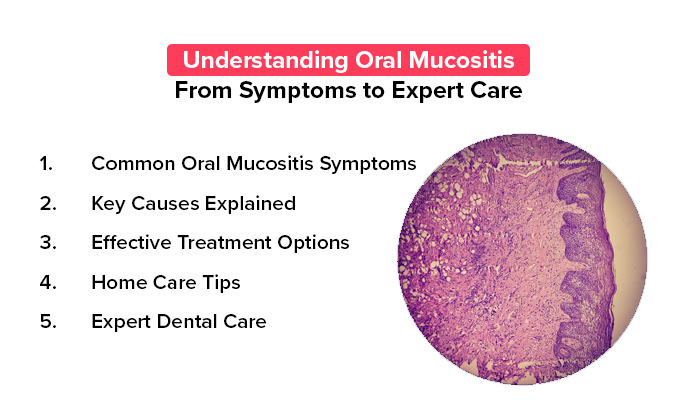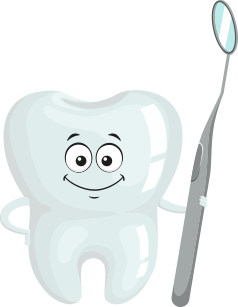Oral Mucositis – Symptoms, Causes, Treatment

A sudden burning sensation inside your mouth, painful ulcers and difficulty eating can be more than just common mouth sores; these could be signs of Oral Mucositis. This condition often appears as painful inflammation or ulcers inside the mouth usually triggered by medical treatments like chemotherapy or radiation therapy.
Understanding what Oral Mucositis is also why it happens and how it can be effectively treated can make a major difference in your comfort and recovery. In this expert-verified guide by Radiant Dental Care let’s break down everything you need to know from its symptoms and causes to diagnosis and treatment options.
What is Oral Mucositis?
Oral Mucositis is an inflammatory response or ulceration of the mucous membranes in the mouth. It is most common in patients receiving cancer treatment like chemotherapy or radiation as these treatment damage the rapidly dividing cells of the oral mucosa.
The severity of this condition can be limited to the redness of the mucosa or may extend to the formation of extremely painful ulcers which may make eating, swallowing and speaking difficult. Besides the discomfort the patient’s immune system is also at a higher risk of infections leading to a postponement of the treatment schedule if oral mucositis is not managed properly.
Oral Mucositis Symptoms
Identifying symptoms early helps in faster relief and prevention of complications. Here are the most common signs to look out for:
- Redness or swelling inside the mouth.
- Painful ulcers or open sores on the tongue, gums or inner cheeks.
- Burning or stinging sensation while eating or drinking.
- Dryness and loss of moisture in the mouth.
- Difficulty in swallowing or speaking.
- Bleeding gums or sensitivity to spicy and acidic foods.
In severe cases the pain can become intense enough to interfere with daily nutrition and oral hygiene. Recognizing these Oral Mucositis symptoms at an early stage ensures timely medical attention and faster healing.
Oral Mucositis Causes
The most frequent cause of Oral Mucositis is cancer treatment particularly chemotherapy and radiotherapy. However it can also be an effect of various contributing factors. What are the common causative factors of Oral Mucositis?
- Chemotherapy: These drugs are not selective to cancer cells only they also affect the healthy cells that line the mouth.
- Radiation therapy: The adverse effects are most noticeable when the radiation is aimed at the head or neck area.
- Poor oral hygiene: The bacteria and plaque that cause inflammation of the mouth tend to accumulate if oral hygiene is neglected.
- Mouth infections: The presence of fungal or viral infections in the mouth can both initiate and worsen mucositis.
- Nutritional deficiencies: Inadequate intake of vitamins such as B12, iron and folate makes one more susceptible to the condition.
- Tobacco and alcohol use: These substances exacerbate the oral tissues and cause extension of the damaged area.
- Dehydration: Less water intake or more water loss leads to the reduction of saliva flow and thus the mouth is more vulnerable to damage.
Being aware of these causative factors your dentist will be able to organize the prevention plan well in advance before the initiation of the treatments.
Diagnosis: How Oral Mucositis is Identified
Dentists usually identify Oral Mucositis through a thorough clinical examination of your mouth. In some cases your doctor may ask about your recent medical history especially if you are undergoing cancer therapy.

The condition is typically classified based on its severity using a grading scale:
- Grade 1: Mild soreness and redness.
- Grade 2: Pain with ulcers but able to eat solid food.
- Grade 3: Severe pain and ulcers causing difficulty in eating solid food.
- Grade 4: Inability to eat or drink due to severe pain and extensive ulcers.
This grading helps determine the right Oral Mucositis treatment plan for effective management.
Oral Mucositis Treatment
Treatment for Oral Mucositis focuses on pain relief also in promoting healing and preventing infection. Depending on the severity a combination of therapies may be used.
Here’s a complete overview of the most effective Oral Mucositis treatments:
1. Pain Management
Pain control is crucial to ensure you can eat and maintain nutrition. Your dentist may suggest:
- Topical anesthetic gels or mouth rinses to numb the affected area.
- Mild painkillers to reduce discomfort.
- Cold therapy (like sucking on ice chips) to soothe inflammation.
2. Oral Hygiene Maintenance
Keeping the mouth clean prevents bacterial growth and secondary infections. You may be advised to:
- Brush gently using a soft-bristled toothbrush.
- Rinse with saltwater or prescribed mouthwash.
- Avoid alcohol-based mouth rinses and spicy foods.
3. Hydration and Nutrition
Adequate hydration keeps your mouth moist and helps healing. Tips include:
- Drink plenty of water and fresh juices.
- Eat soft and bland foods like soups, mashed potatoes or smoothies.
- Avoid citrus fruits or acidic drinks that can sting.
4. Medical Treatments
In some severe cases dentists may recommend:
- Antibiotic or antifungal mouth rinses to prevent infections.
- Growth factor gels or medicated mouth coatings to promote faster tissue repair.
- Low-level laser therapy (LLLT) for tissue regeneration and pain relief.
5. Preventive Strategies
If you are about to begin chemotherapy or radiation preventive steps can help reduce the risk:
- Maintain excellent oral hygiene before starting treatment.
- Undergo a dental check-up to fix any existing oral infections.
- Follow a custom oral care plan recommended by your dentist.
Managing Oral Mucositis at Home
While professional care is vital you can manage mild mucositis effectively at home with these supportive tips:
- Use gentle saline rinses several times a day.
- Keep your mouth moist using saliva substitutes or sugar-free gum.
- Avoid smoking and alcohol as they can irritate sores.
- Use lip balm to prevent dryness and cracks.
- Ensure adequate nutrition focusing on vitamin-rich foods.
These steps not only speed up recovery but also prevent worsening of the condition.
When to See a Dentist
If you notice persistent pain, swelling or ulcers that last more than a week it is crucial to consult a dentist immediately. Delaying treatment can lead to:
- Infections spreading to deeper tissues.
- Nutritional deficiencies due to poor eating habits.
- Treatment interruptions if you’re undergoing chemotherapy.
Seeking timely care from experts at the best dental hospital in Chennai ensures comprehensive diagnosis and treatment for long-term relief.
Recovery and Prognosis
Generally, the first two to four weeks after cancer therapy or with appropriate dental care, are the healing time for the majority of Oral Mucositis cases. Nevertheless, extreme instances might take a protracted period and thus necessitate continuous observation.
After the implementation of the dentist’s instructions keeping up with oral hygiene and being well hydrated will not only help the recuperation process but also lower the probability of the condition coming back.
Complications of Untreated Oral Mucositis
If left unmanaged timely then mucositis can lead to several complications, including:
- Secondary infections due to open ulcers.
- Weight loss and dehydration from difficulty eating.
- Increased hospitalization time during cancer treatment.
- Emotional distress caused by chronic pain.
Early diagnosis and consistent care play a major role in avoiding these outcomes.
Expert Guidance and Lasting Relief at Radiant Dental Care
Oral Mucositis, although it may be just a slight pain at the beginning, its impact can increase rapidly if the situation of not being treated is prolonged. Recognizing the condition early along with maintaining good oral hygiene and visiting the dentist in time will help you to avoid complications and facilitate a quicker healing process.
At Radiant Dental Care, every patient is provided with leading, compassionate, and customized care for the case of Oral Mucositis. The proficient team at the clinic is blending state-of-the-art diagnostic instruments with the implementation of the latest scientific research to bring fast alleviation of symptoms, the least possible distress, and oral health stability in the long run.
If you are suffering from painful mouth ulcers or if you are looking for preventive dental care, the best dental clinic in Chennai will ensure that you get proper support at every stage from diagnosis to recovery and beyond. By receiving the right treatment and being attentive to your needs you will be able to bring back your comfort, increase your self-esteem and keep a healthy smile for a long time.
Frequently Asked Questions:
1. How Long is the Healing Time for Oral Mucositis?
Ans. Generally, mild forms of Oral Mucositis go away on their own after 2 to 3 weeks. However if the condition is due to cancer treatments such as chemotherapy or radiation the healing time might be extended and the patient may require dental care regularly.
- Are There Ways to Prevent Oral Mucositis?
Ans. Definitely. Keeping to a routine of brushing and rinsing, consuming sufficient water and going to your dentist for a check-up before starting the cancer treatment are some of the measures that can help prevent Oral Mucositis.
- Could One Hold the View That Oral Mucositis Is Contagious?
Ans. Absolutely not; it is not contagious at all. Oral Mucositis is a condition that results from damage to the internal tissues; thus one cannot acquire it from another person.
- What Should I Not Eat Upon Oral Mucositis Diagnosis?
Ans. Do not take spicy, acid or hard foods as these agents will further irritate the sores on your mouth. Besides that you can consume soft and bland foods such as soups, mashed potatoes or smoothies which are convenient to eat.

 +91 9513446186
+91 9513446186
